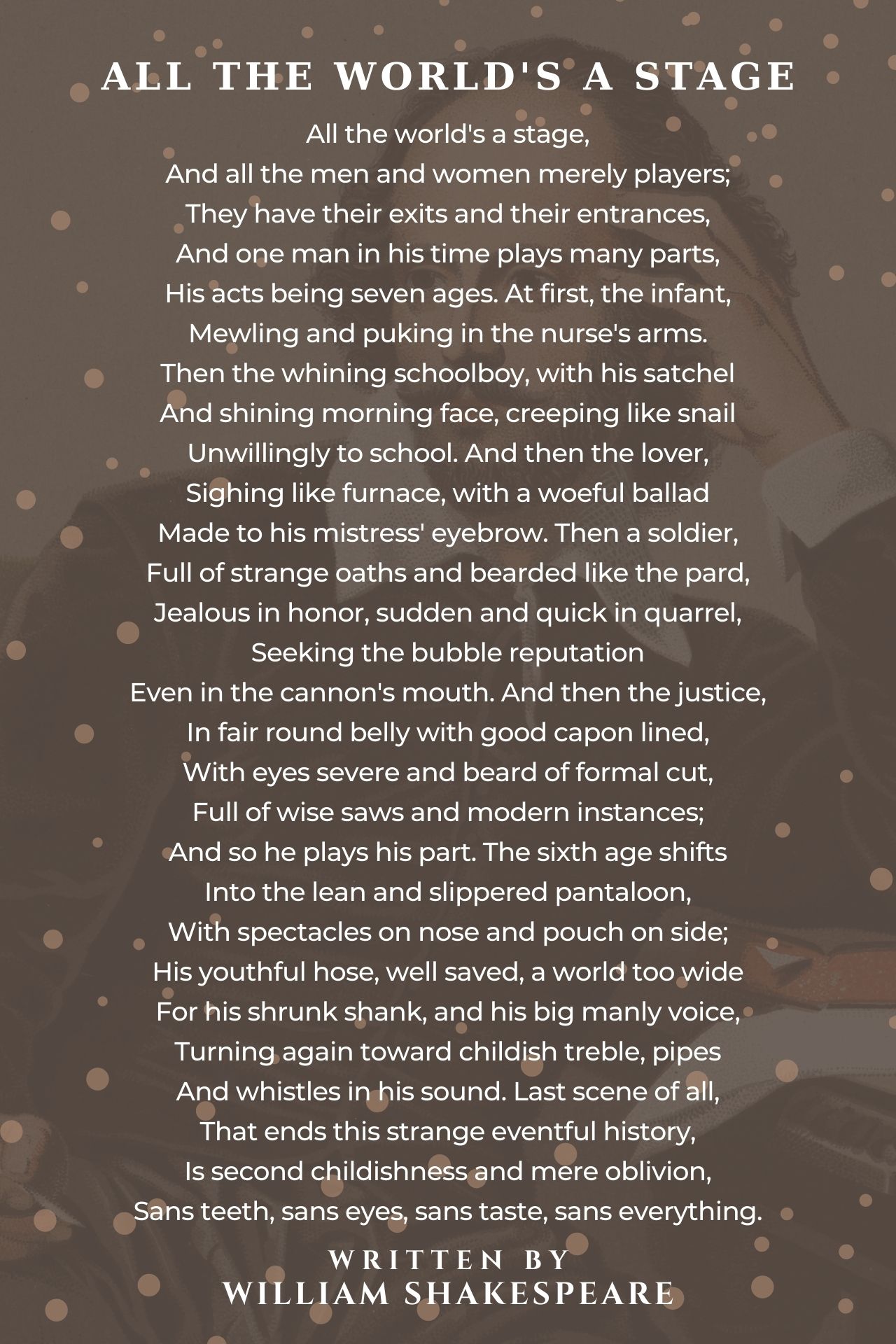All The World's A Stage Poem by William Shakespeare
All The World's A Stage
All the world's a stage,
And all the men and women merely players;
They have their exits and their entrances,
And one man in his time plays many parts,
His acts being seven ages. At first, the infant,
Mewling and puking in the nurse's arms.
Then the whining schoolboy, with his satchel
And shining morning face, creeping like snail
Unwillingly to school. And then the lover,
Sighing like furnace, with a woeful ballad
Made to his mistress' eyebrow. Then a soldier,
Full of strange oaths and bearded like the pard,
Jealous in honor, sudden and quick in quarrel,
Seeking the bubble reputation
Even in the cannon's mouth. And then the justice,
In fair round belly with good capon lined,
With eyes severe and beard of formal cut,
Full of wise saws and modern instances;
And so he plays his part. The sixth age shifts
Into the lean and slippered pantaloon,
With spectacles on nose and pouch on side;
His youthful hose, well saved, a world too wide
For his shrunk shank, and his big manly voice,
Turning again toward childish treble, pipes
And whistles in his sound. Last scene of all,
That ends this strange eventful history,
Is second childishness and mere oblivion,
Sans teeth, sans eyes, sans taste, sans everything.

In As You Like It, Act 2 Scene 7, Shakespeare has Jaques talk through the ‘seven ages of man’. According to Shakespeare’s monologue the seven ages of man are: Stage 1, Infancy: A helpless baby, just crying and throwing up. Stage 2, Schoolboy: This is where his formal education starts but he is not entirely happy with school. His mother is ambitious for him and has washed his face thoroughly before sending him off to school but he goes very slowly and reluctantly. Stage 3, Teenager: He’s grown into his late teens and his main interest is girls. He’s likely to make a bit of a fool of himself with them. He is sentimental, sighing and writing poems to girls, making himself a bit ridiculous. Stage 4, Young man: He’s a bold and fearless soldier – passionate in the causes he’s prepared to fight for and quickly springs into action. He works on developing his reputation and takes risks to that end. Stage 5, Middle aged: He regards himself as wise and experienced and doesn’t mind sharing his views and ideas with anyone and likes making speeches. He’s made a name for himself and is prosperous and respected. As a result of his success he’s become vain. He enjoys the finer things of life, like good food. Stage 6, Old man: He is old and nothing like his former self – physically or mentally. He looks and behaves like an old man, dresses like one and he has a thin piping voice now. His influence slips away. Stage 7, Dotage and death: He loses his mind in senility. His hair and teeth fall out and his sight goes. Then he loses everything as he sinks into the oblivion of death. [in ''No Sweat Shakespeare'']
About the 7 ages of man: Shakespeare did not invent the idea of the stages of life: philosophers have been addressing it for millennia. Aristotle had four ages of man and they were extended to seven in the middle ages where philosophical and religious lists were usually in sevens. (The seven deadly sins, the seven sacraments, the seven heavenly virtues, and so on) . By the time the Elizabethan age arrived it was a most familiar idea and Shakespeare’s audience would immediately have recognised the concept. [in ''No Sweat Shakespeare'']
World's a stage Then who is pulling on and off the curtain? Rather are we just puppet? Or a silence audience?
A great meaningful poem ever relevant and practical likes the great poet

The idea of the 'WORLD as a STAGE', though not original, was a metaphor Shakespeare appreciated, being an actor, stage writer and theatre proprietor. He uses it frequently and, of course, it fits in nicely with the metaphor of human life as a play with actors. Another of Shakespeare’s favourite soliloquies is the ‘Tomorrow and tomorrow and tomorrow’ passage where Macbeth compares his life to that of a short, emotional performance by an actor on a stage: ‘A walking shadow, a poor player That struts and frets his hour upon the stage And then is heard no more: it is a tale Told by an idiot, full of sound and fury, Signifying nothing.’ - Macbeth: Act 5, Scene 5 -